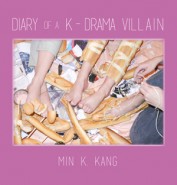
Book Review: Diary of a K-Drama Villain by Min K. Kang

Diary of a K-Drama Villain
Min K. Kang
Coconut Books, November 2015
ISBN-13: 978-1938055287
$14.00; 80 pp.
Reviewed by Stephanie Barbé Hammer
Visualize French cubist pioneer surrealist poet Guillaume Apollinaire viewing an array of YouTube clips from Korean soap operas. Sure, he’d be bowled over by different visual styles of hits like Boys over Flowers, Coffee Prince, You are Beautiful, and The Secret Garden. But he would also notice certain imagistic similarities: the sheen of airport terminals, the glitter of china in hotel restaurants, and even the sweetly decorated immaculate sheets on the bed in the poor heroine’s tiny bedroom. Above all, he would note the electronic rectangles used by the characters to mark a melancholy moment in the bus, or record yet another instance of perfect hair.
Now imagine the villains of K-Drama—who are predominantly female—employing the delicately fractured poems of Modernist French poetry for their own lyric reflections. What poems might they compose at the hair salon, the remote island spa, or in their expensive sports car?
This double imagining approximates but does not do justice to Min K. Kang’s strange and beautiful poetry collection, bound into a small square that resembles a children’s board book. Kang uses surfaces and contemporary media to wittily explore what gets to be a subject for poetry and how much the poet dares reveal:
not all poets would own up to wearing Christian Dior Crème de la Rose
but you Poet, would mention that your spendy sister got it for you
But Kang also uses surface to plumb the depths of some hidden psyche, even as she ironically wonders about her own positioning as the fetishized object of an Anglo-European gaze, as she does in the closing lines of “yellow pearls in edible drops to stomach:”
when there is something pretty and cute
and nice, it’s something to be fucked with
……………………ask the Surrealists—
…………you know when you smile like that
…………it’s not very natural
……………………(but this is my face)
The explanatory notes at the end of the collection form their own sort of metafictional coda. They comically explain the obvious and the obscure depending on who the reader is, thereby obliging “us” to consider the boundaries and limits to our own cultural imaginings.
A startling, fascinating collection that invites us to puzzle over the beautifully fragmented pictures that Kang scatters on the page.
Stephanie Barbé Hammer is Professor Emerita of Comparative Literature at the University of California, Riverside. She is the author of three scholarly books, a prose poem chapbook, a poetry collection, and a novel. An award-winning educator, Stephanie teaches creative writing at non-profits, community colleges, and online. She is currently working on a novel about fangirls, right-to-lifers and suicides as well as a poetry collection about trying to deal with nature when you’re from Manhattan.

Leave a Reply